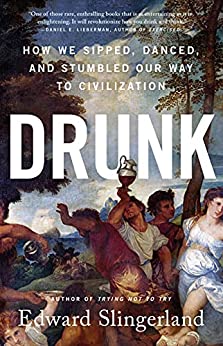More on this book
Community
Kindle Notes & Highlights
Read between
November 18 - November 23, 2021
All over the world, wherever you find people, you find them doing disgusting things, incurring incredible costs, and expending ridiculous amounts of resources and effort for the sole purpose of getting high.2 Given how central the intoxication drive is to human existence, the archaeologist Patrick McGovern has only semi-facetiously suggested that our species be referred to as Homo imbibens.3
As the writer Michael Pollan has argued, Johnny Appleseed, whom American mythology now portrays as intent on spreading the gift of wholesome, vitamin-filled apples to hungry settlers, was in fact “the American Dionysus,” bringing badly needed alcohol to the frontier. Johnny’s apples, so desperately sought out by American homesteaders, were not meant to be eaten at the table, but rather used to make cider and “applejack” liquor.
Humans are powerful in groups precisely because we are weak as individuals, pathetically eager to connect with one another, and utterly dependent on the group for survival.
We get drunk because we are a weird species, the awkward losers of the animal world, and need all of the help we can get.
Intoxication technologies, alcohol paramount among them, have historically been one way we have managed to leave the door open for Dionysus. And it is sipping, dancing, wildly ecstatic Dionysus who freed us from our selfish ape selves long enough to drag us, stumbling and laughing, into civilization.
The most important thing that neo-Prohibitionists and health authorities alike fail to consider in coming down on the side of total abstinence is that the obvious physiological and psychological costs of alcohol must be weighed against their venerable role as an aid to creativity, contentment, and social solidarity.
Video meetings are probably more efficient; but efficiency, the central value of Apollo, is the enemy of disruptive innovation. The pub doesn’t just make us feel better; used properly, it makes us, in the long run, work better.
Alexander Shulgin, a pioneer in the research of synthetic psychoactive drugs, gives this account of his experience on 120 mg of pure MDMA: I felt that I wanted to go back, but I knew there was no turning back. Then the fear started to leave me, and I could try taking little baby steps, like taking first steps after being reborn. The woodpile is so beautiful, about all the joy and beauty that I can stand. I am afraid to turn around and face the mountains, for fear they will overpower me. But I did look, and I am astounded. Everyone must get to experience a profound state like this. I feel
...more
While it is socially acceptable to talk in purely aesthetic terms about our interest in fine wine, microbrewed beer, or designer cannabis, we remain uncomfortable talking about our need for embodied pleasure for its own sake, rather than as a side effect of more respectable, abstract connoisseurship. This is a hang-up that we need to get over.
Acknowledging the downsides and risks of chemical intoxication, however, is crucial to any comprehensive defense of ecstatic chemical joy. And chemical joy needs to be defended.


